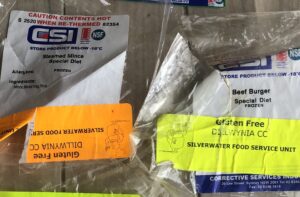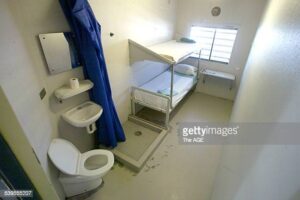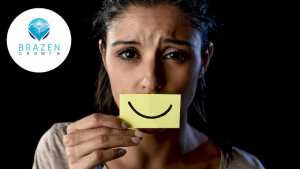You might think that it is strange that I have these prison food labels. I found them amongst cards and letters that I was sent by family and friends. They show a couple of things on the labels, but to me they represented something so much greater.
I am gluten intolerant (medically diagnosed). I will never forget the first month of incarceration when I had to wait 4 weeks to see the prison doctor to get a certificate for a ‘special diet’ due to a medical condition. I felt nauseous and every day my digestive system was in a mess. I was sharing a cell with a woman I didn’t know, where the dirty stainless-steel toilet is in the cell with no walls (yes, you are going to the toilet in front of each other). I was scared, embarrassed and ashamed to be having this problem in a frightening environment that I had never experienced.

I was trapped not only physically but I was tormented fighting for my mental health as well as my physical health. Being incarcerated amplified the low self-worth I had experienced for decades and I had history of depression and anorexia nervosa. To not eat what I was given posed a very real mental health risk; a path I knew was destructive. And I did not want to live at this point. When I finally got to the prison doctor, she said my abdomen sounded like a war zone. I was given a certificate for ‘special gluten-free’ meals.
These are some of the labels. Underneath the ‘special diet’ stickers, it states ‘contains gluten’. This was not for all the meals but many of them. I also received meals where the container had black mould on the bottom. My lunch was often rice cakes that you could bend in half like rubber and they didn’t break. These were accompanied by about ¼ cup of three bean mix. The gaol baked gluten free bread I received was often 6 weeks old and was broken often looking like breadcrumbs. The only fresh produce we had was apples or bananas. No fresh vegetables and the ‘meat’ we were given was highly processed.
If deceptive labels were on any product in the community, there would be an uproar and a lawsuit! Imagine if someone was allergic to gluten and had been given these falsely labelled meals, trusting that they were indeed gluten free? I had sent these labels to my older son who contacted the NSW Ombudsman at the time as an attempt to point out this situation. This appeal did not assist. It is well researched that sound nutrition is one of the protective factors for positive mental and physical health. In the community there are many programs that communicate this. Our self-worth is impacted by our physical and mental wellbeing. Many people enter prison with their physical and mental health already compromised. If ‘correction’ was truly the aim, then these basic human needs for health need to be as they are in the community.
I sat on the grey concrete floor of the cell despising myself; not my body or body weight. Myself. As a person. Never feeling I was worthy. “You deserve to be here! You don’t deserve good healthy food! You are dirty!” These were the thoughts that screamed loud in my mind.

How can you feel worthy when you are in prison? I contemplated two choices I had. One was to revert back to the unhealthy means of dealing with feelings I had experienced of low self-worth. I could choose to not eat as a means of punishing myself for how I felt and for the thoughts I was having. The other was to start to really believe what my forensic psychologist worked with me on for 9 months before being sentenced. Looking to all my strengths, the many positives I had in my life and to practice healthy assertive self-talk each time the negative thoughts came. Each time. Every time. Without fail. For if I didn’t, I would be right back to the crushed self I was prior to offending.
I refused to go backwards. I chose every day to like myself despite my mistakes and current circumstance. I bought food supplies from the weekly prison ‘buy-up’ shopping list. Tins of tuna and microwave brown rice were my staples. There were no perishable fresh food items on this list, and you had to be lucky enough to have family and friends to put money in your gaol account to be able to purchase from the buy-up. Either that or you worked a gaol job for under a dollar an hour.
In prison, under these circumstances, was when I realised that I had truly recovered from anorexia. I had a healthy weight for decades prior to this. I had three children. My thoughts about self were unhealthy. My coping mechanisms were unhealthy. I did not value me. This was the hardest time of my life, but you can only see light clearly and brightly in the midst of darkness.
A relationship with food was not the problem.
A relationship with exercise was not the problem.
These were signs and symptoms.
It was the relationship with MYSELF that needed healing.



